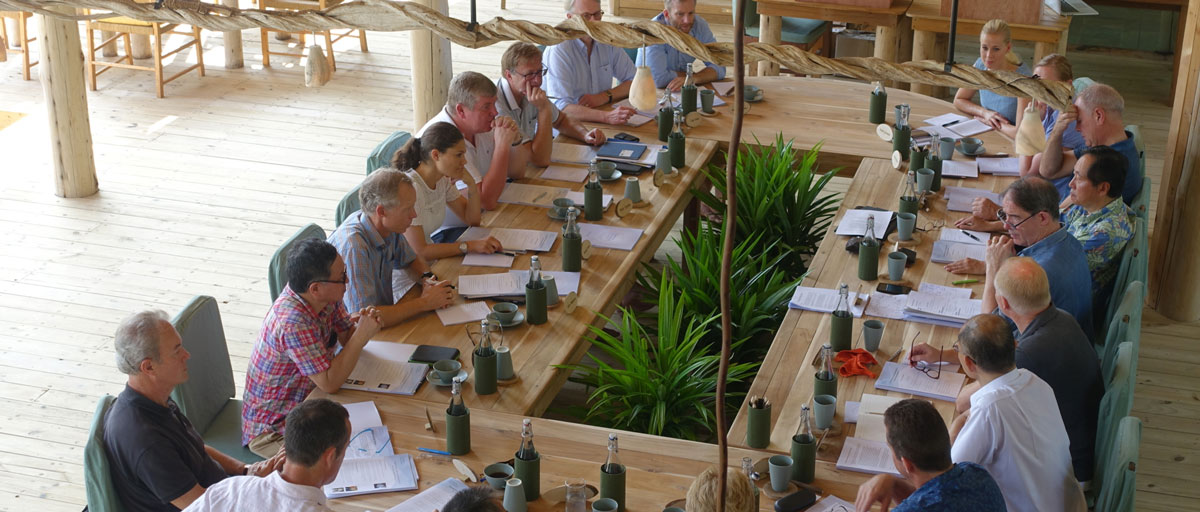Partnerships and change processes
Researchers from the SRC have since 2012 worked closely with the largest corporations in the global seafood industry in a quest to make it more sustainable. The collaboration resulted in the Seafood Business for Ocean Stewardship initiative, the first time companies from Asia, Europe and the US have joined forces and committed to work on an agenda for change.

We want to be an active, scientific partner in multiple change processes. That is why we develop science with real world application
Co-design and co-production of knowledge is a hallmark of our work, regardless if it is informal dialogues with small communities or senior executives of large international companies.
This interaction shapes our research focus and helps us become better sustainability scientists. We understand more of the world and can ask more informed questions. We get access to better data and can develop novel concepts and approaches that shape our investigations.
We develop new concepts, tools and approaches for a more resilient and equitable future.
Building and expanding on the legacy of resilience thinking, we integrate an understanding of ecosystem dynamics with human behaviour, global financial markets, gender, equity and power, and much more.
We have a long history of helping to navigate the unknown and bringing together the right people. Examples include:
- In 2011, we convened and organised together with partners the third Nobel Laureate Symposium on Global Sustainability. Nobel Laureates, scientists, practitioners, policymakers and UN Secretary General’s High-Level Panel on global sustainability attended the meeting. Several of the conclusions from the symposium were later incorporated into the UN High-Level Panel’s final report Resilient people, Resilient Planet: A future worth choosing.
- Since 2012 we have worked closely with the largest corporations in the global seafood industry in a quest to make it more sustainable. The Seafood Business for Ocean Stewardship initiative is the first time companies from Asia, Europe and the US have joined forces and committed to work on an agenda for change. It also illustrates how sustainability scientists can actively engage as change-makers.
- The Planetary Boundaries concept has, since its inception in 2009, become one of the most important frameworks for global sustainability thinking. Led by Johan Rockström, 28 internationally renowned scientists identified and quantified a set of nine planetary boundaries within which humanity can continue to develop and thrive for generations to come.
- We have collaborated with the World Business Council for Sustainable Development (WBCSD), a CEO-led, global association of some 200 international companies. The collaboration helped WBCSD to align their Vision 2050 Framework with the planetary boundaries concept.
- In 2017, we became the scientific partner of a new project with the Ellen MacArthur Foundation and the Swedish clothing retailer H&M Group. The project is part of the SRC’s ongoing efforts to downscale and operationalize the planetary boundaries framework.
- We also collaborate with L’Oréal to assess how well the cosmetics company’s current sustainability practices and metrics deal with global environmental problems, using the planetary boundaries as a framework.
- We are the scientific partner to EAT, an international science-policy-business platform to reform the global food system. EAT is designed to bring together the stakeholders from the food industry to accelerate and scale up the work towards a more sustainable and healthy production and consumption of food.
- The project Resilience in practice for Swedish governance tests and develops methods for how resilience thinking can be used in local and regional strategic planning for sustainable development in Sweden.
- SwedBio is a programme based at the Stockholm Resilience Centre which helps develop and implement policies and methods on poverty alleviation, equity, biodiversity and sustainable livelihoods.
- The Global Resilience Partnership (GRP) is made up of 70 + organisations that work together to advance resilience through identifying and scaling on the ground innovation, generating and sharing knowledge, and shaping policy. GRP is registered as a non-profit organisation in South Africa and co-hosted by the Stockholm Resilience Centre at Stockholm University.






